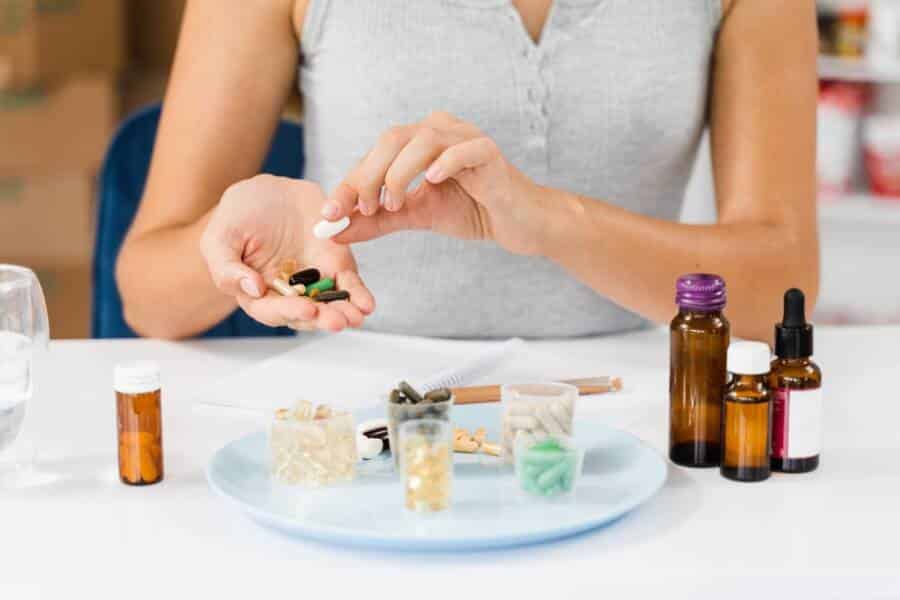Did you know that your daily supplements can turn into harmful vitamins?
Nowadays, everything from orange juice to bottled water has high levels of vitamins and minerals.
Typically, this can be a fantastic way to help take care of your nutritional bases, especially if your diet is less than ideal. But routinely getting an overload of minerals and vitamins can ultimately hurt you.
Most people take vitamins expecting some sort of miracle health boost. But sometimes, often due to the mega doses in multivitamin supplements, they have the opposite effect and become potentially harmful vitamins.
The reality is that they’re unregulated, meaning anything could be in that bottle you just picked up at the grocery store.
And while you probably aren’t getting super doses, if you eat a bowl of fortified cereal at breakfast, munch on an energy bar between meals, have pasta for dinner, and take your daily supplement, you could easily be going over the recommended daily intake of a wide range of nutrients.
Remember that supplements should be “supplementing” a well-balanced diet, not replace it.
The best thing to do is to work with a registered dietitian to find the ones that suit your needs, then make sure your doctor knows what you’re taking because some vitamins can interact with medications, even in small doses.
But to get you started on the matter, let’s review the safety of taking the following 9 vitamins and the potential risks associated with consuming high doses.

But first, Fat-soluble vs. water-soluble vitamins. What’s the difference?
The 13 known vitamins are divided into two categories — fat-soluble and water-soluble.
Water-soluble vitamins
Due to the fact that water-soluble vitamins aren’t stored but excreted through urine, they’re less likely to cause problems even when taken in higher doses. But, taking super doses of some water-soluble versions can lead to potentially harmful vitamin side effects.
For instance, taking too much vitamin B6 can lead to potentially irreversible nerve damage if taken for long periods of time, while taking large amounts of niacin can cause liver damage.
Water-soluble vitamins are readily eliminated from the body and aren’t easily stored in tissues. There are more water-soluble versions than there are fat-soluble ones. The potentially harmful vitamins include vitamin C, plus the following B vitamins:
-Vitamin B1/thiamine
-Vitamin B2/riboflavin
-Vitamin B3/niacin
-Vitamin B5/pantothenic acid
-Vitamin B6/pyridoxine
-Vitamin B7/biotin
-Vitamin B9/folate
-Vitamin B12/cobalamin
Fat-soluble vitamins
Fat-soluble vitamins can accumulate in the body. So, these nutrients are more likely to lead to toxicity than the water-soluble versions. Even though it’s rare, taking too much vitamin A, D, or E can lead to potentially harmful vitamin side effects.
On the other hand, taking high doses of non-synthetic vitamin K seems relatively harmless. So, an upper intake level hasn’t been set for this nutrient.
Upper intake levels indicate the maximum dose of a nutrient unlikely to cause harm for nearly all individuals in a general population.
Unlike water-soluble vitamins, the fat-soluble ones don’t dissolve in water and are easily stored in one’s body tissues. There are four fat-soluble vitamins:
-Vitamin A
-Vitamin D
-Vitamin E
-Vitamin K
Now that we’ve gotten that out of the way let’s discuss the potentially harmful vitamins we mentioned above:

Calcium
Many Americans, especially youths, consume less calcium than is required for bone health. And postmenopausal women or anyone who skips dairy is at an increased risk for having calcium deficiency.
Calcium is plentiful in dairy products and is included in fortifying cereal and some juices. Beyond that, excessive calcium can lead to frequent urination, low muscle mass, fatigue, constipation, weight loss, and heart arrhythmia.
Some research even suggests that high calcium intake is related to heart disease and prostate cancer.
Vitamin A
Vitamin A deficiency is pretty rare in the US, where most people get a sufficient amount from food sources. Adults shouldn’t have more than 3,000 mcg daily, though.
But, if excessive vitamin A builds up in the liver, it can cause blurred vision, aching muscles, nausea, and coordination problems.
Niacin/Vitamin B3
Niacin is an essential vitamin for cell health and energy. Most of the American population gets plenty of it through food sources, but some take supplements in hopes of getting an energy boost or to treat high cholesterol issues.
Taking more than 30 mg of niacin daily can cause the skin on one’s face and chest to redden, tingle, warm, or itch.
Beta-Carotene
Beta-carotene is a carotenoid that the body is able to convert into vitamin A. But sadly, high doses of beta-carotene from supplements is related to an increased risk of getting lung cancer.
Vitamin B6
Vitamin B6 is essential for metabolism and brain development. Long-term overconsumption, which is over 100 mg daily unless directed by a doctor, can ultimately lead to nerve damage, which would make it challenging to control movement.
It’s also associated with sensitivity to the sun and patchy skin.
Vitamin D
Vitamin D is world-famous for being the sunshine vitamin because a person’s body can make it in a process that involves the sun striking uncovered skin. And through this method, or from food sources, you’re unlikely to get too much.
It comes out to more than 100 mcg unless a doctor advises. Still, vitamin D is one of the most repeatedly supplemented because it can be challenging to get through a diet or the sun. Because it aids in calcium absorption, a surplus can lead to hypercalcemia.
Signs of this include muscle weakness, pain, nausea, excessive thirst, and even kidney stones.
Folate/Vitamin B9
Folate is essential for cell division. Most of the US population gets enough of it through diet. But a supplement is often recommended, particularly regarding pregnant women.
The issue, though, is that high doses of folate can hide a vitamin B12 deficiency, which can ultimately lead to nerve damage. A possible connection between high folic acid, which is a form of folate, and increased risk of colorectal cancer is also being studied.
Vitamin E
Vitamin E is an antioxidant that aids in preventing cell damage from free radicals. There’s no risk of consuming too much of it from food, although adults shouldn’t take more than 1,000 mg daily.
Yet a high intake of alpha-tocopherol, which is a form of vitamin E in supplements, can impact blood clotting and cause bleeding.

Iron
Children, teenage girls, and those who are pregnant or menstruate are at a higher risk of becoming iron deficient. Healthcare providers may recommend high doses of iron or supplements if you’re at risk of deficiency.
In childbearing years, women should be getting 15 to 18 mg of iron daily. That number increases to 27 mg during their pregnancy. As a rule, excessive iron intake from food sources is unlikely for individuals without intestinal issues.
But taking supplements with over 25 mg of iron can lead to stomach issues including constipation, pain, nausea, vomiting, and diarrhea.
A surplus of iron can also decrease the absorption of the mineral zinc. In severe cases, high doses of iron can lead to organ failure and even a coma. For a healthier way of getting iron, check THIS out!
The Bottom Line
Even though many individuals safely consume vitamin supplements daily, taking too high of a dose is possible, which can result in adverse side effects. Overdosing on specific vitamins can lead to severe complications and, in some circumstances, prove to be fatal.
For these reasons, it’s crucial to use vitamins responsibly and consult your doctor if you have questions regarding proper dosing.
We hope this post on potentially harmful vitamins has been useful. Be sure to share your thoughts with us in the comments section.
And if you’re looking for some more insightful tips, Indulging Health has got you covered. Check out: High Cortisol Levels: 12 Worrying Signs and What to Do About It














2 Responses
Regarding Your Article on 9 Potentially Harmful Vitamins that can Threaten Your Health
Thank you for posting this article, I enjoyed reading it. I happen to stumble upon this article, looking for other information on nutrition, and your article save me from potential damage. I am currently taking 50mcg of vitamin D per doctor’s orders and then started taking a multivitamin which also has another 50 mcg of vitamin D. I started having severe dry mouth and needed to drink water all the time. Thanks to your article, I have solved my problem. In the future, I will be more careful to double check all bottle of vitamins to be sure that I am not overdosing myself. Thank you.